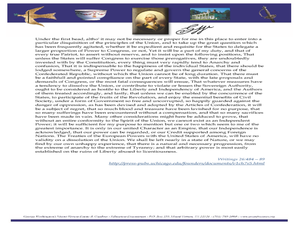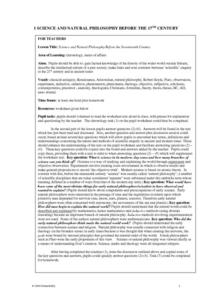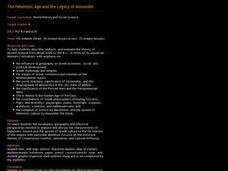Curated OER
Ancient Greek Philosophers:Socrates, Plato, and Aristotle
Students discover the famous Greek Philosophers. In this Greek lesson, students find the contributions of Ancient Greece and their philosophers. This lesson includes brief bios on Socrates, Plato, and Aristotle
K20 LEARN
Ancient Philosophy: Greeks or Romans?
While often not recognized, the ideas of ancient Greek and Roman philosophers still echo today. Using a series of videos and graphic organizers, individuals explore how ancient Greeks and Romans have influenced current Western political...
Curated OER
Plato and The Republic
Students recognize that in the book The Republic, Plato described the ideal society. They adopt, modify, or reject Plato's views as they describe another, smaller ideal society: Utopia High School. In addition, they summarize the...
Pearson
Lesson Plan: Introduction to Plato’s Cave
Can we perceive reality or are we chained by preconceptions that limit our vision? Plato’s allegory “The Cave” serves to introduce nascent philosophers to Plato’s dialogues and hopefully to engender a love of ideas and discourse. A...
Curated OER
George Washington & the Classics
High schoolers will compare and contrast famous philosophers with George Washington. In this history lesson, students work in small groups to define Classicism, Legalism, Democracy, Republic and Civility, then read some short...
Curated OER
Science and Natural Philosophy Before the Seventeenth Century
Students complete a worksheet about some of the natural philosophers in history. They use graph paper and create a timeline with the dates of birth and names of a list of natural philosophers. They list four questions concerning life and...
National Endowment for the Humanities
The Victor's Virtue: A Cultural History of Sport
Pupils explore the meaning of the ancient Greek word aretê and the place of virtue in historical athletic competition and modern sports. They begin by reading an informational text on the goal of sports in education, and then...
Curated OER
Argument in an Athenian Jail: Socrates and the Law
Students read and discuss Socrates's "Crito" and examine the arguments he made supporting his own death penalty. They consider the still-relevant debate between the rights of the individual and the rule of law.
Curated OER
The Helenistic Age and the Legacy of Alexander
Eighth graders describe, analyze and evaluate the history of ancient Greece from 2000 to 300 B.C. They explore the influence of geography on Greek economical, social, and political development.
Curated OER
Phiolosophy and Politics
Students study about Aristotle, Plato, and Socrates and how their role affected the Greek culture. They look at a video clip from Bill and Ted's Excellent Adventure and note similarities and differences from the movie and what is in...
Curated OER
Argument in an Athenian Jail: Socrates and the Law
High schoolers consider how Socrates might have responded to extenuating circumstances: for example, if his sentence had been imposed by a tyrant rather than in a trial, or if it had been influenced by prejudice.
Curated OER
Meting Out Justice
Students investigate the murder case of Emmett Till and identify the missing pieces from the case. Through research, they then work to fill in the gaps to create a basis for examining how justice might be served anew in this...
Curated OER
Parthenon
Ninth graders explore he purposes of the Parthenon. In this World History lesson plan, 9th graders create a complete picture of the Parthenon. Students research one aspect of the structure and report their findings back to...
Curated OER
How Many Regular Polyhedrons Are There In This or Any Universe?
Students examine the idea of "regularity" as it pertains to geometry. In this geometry lesson students complete several assignments that are part of trihedral angles and regular polyhedrons.













